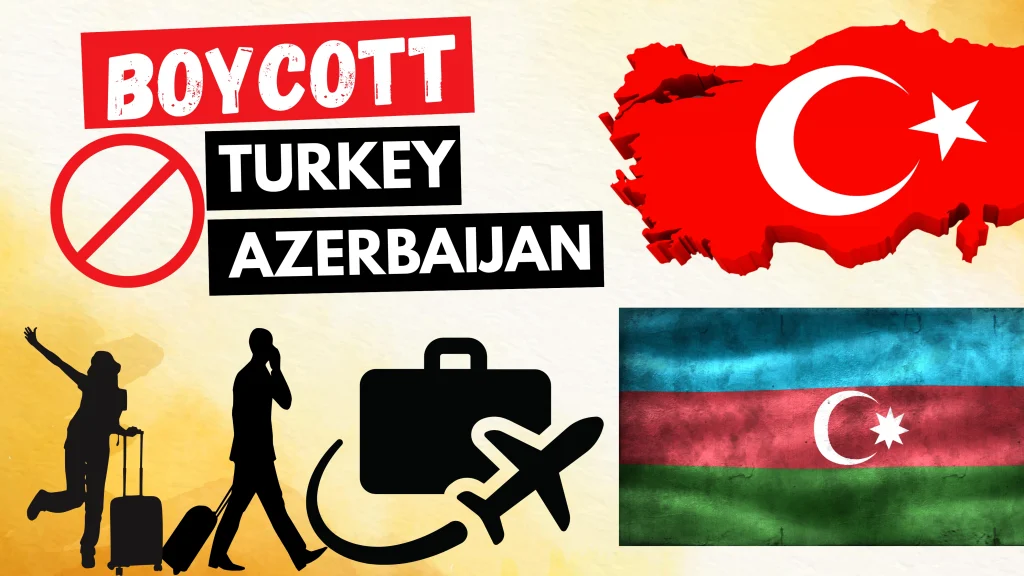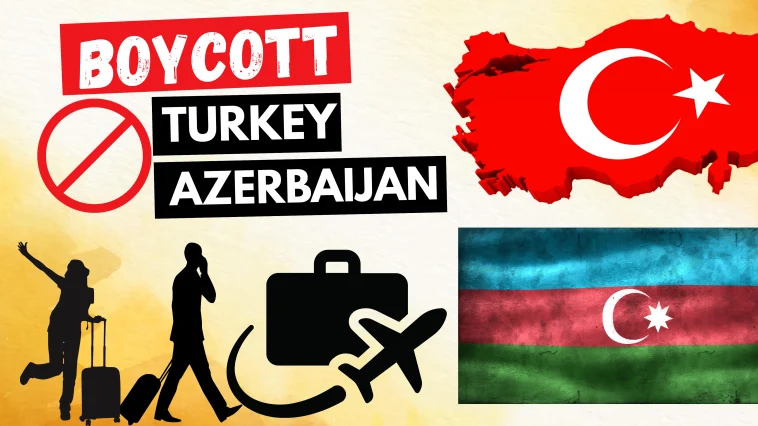On May 15, 2025, India formally released a complete boycott of Turkey and Azerbaijan, demonstrating its official tenacity and sense of national veracity. This move is an answer to the general public assistance that these two nations provided to Pakistan after the terror attack in Pahalgam on April 22 and India’s subsequent army reaction by way of Operation Sindoor.
Travel and tourism, trade, schooling, air travel, and social interactions are all affected by the boycott. It goes beyond simple symbolism. The move clearly shows that India will not accept foreign support for hostile actions that threaten its privacy and national strength.
Turkey and Azerbaijan’s Open Support for Pakistan

The conflict escalated when Turkish President Recep Tayyip Erdoğan called Prime Minister Shehbaz Sharif his “cherished brother.” He also spoke about Turkey’s long-standing partnership with Pakistan. His remarks came on the same day when the country mourned the Pahalgam terror attack. Defenseless civilians were killed in that attack.
Similarly, Azerbaijan supported Pakistan despite clear evidence of cross-border terrorism. It denounced Indian actions and called for a “diplomatic solution.”
India saw these remarks as challenging national security interests and flagrant, courteous meddling.
Impact on Tourism and Travel: A Major Economic Blow
One of the several industries most rapidly impacted by India’s boycott of Turkey and Azerbaijan is the travel and tourism sector. Stepping nationalist emotions and an aggressive public reaction to the geopolitical developments have caused a significant change in the visiting patterns of Indian tourists in that industry, which is well-known for its substantial international fiscal impact.
Sharp Decline in Bookings and Surge in Cancellations
Turkey and Azerbaijan have seen a sharp drop in curiosity, according to India’s leading travel distributors:
- Within days of the boycott’s release, MakeMyTrip, one of India’s top travel booking portals, disclosed a startling 60% decrease in new reservations for Turkey and Azerbaijan. The booking site has also experienced a 250% increase in cancellations of flights, which is indicative of how unpopular the locations are with the general public.
- With a rise of 22% in denials for Turkey and an upsurge of 30% for Azerbaijan, EaseMyTrip additionally verified a significant change in visitor individual tastes. Plenty of Indian travelers currently favor neutral politics as well as culturally interesting destinations like the state of Georgia, Serbia, Greece, Thailand, and Vietnam instead of the warm-weather or fall holidays they had originally planned in these nations.
- Demand has increased for these nations, which provide comparable historical, scenic, and economic offerings, lacking the official controversies.
Suspension of Bookings by Travel Platforms
- Another significant participant in the Indian travel market, Ixigo, has adopted more of an aggressive posture by stopping all reservations to China, Turkey, and Azerbaijan.
- This action is a direct representation of national sentiment as well as a reaction to waning consumer interest.
- In an advertisement, the organization reaffirmed its belief in supporting Indian values and safety fears while arranging its goods and services with the national mood.
Economic Repercussions for Turkey and Azerbaijan
Possible repercussions of the embargo on commerce between India and Turkey.
India’s exports to Turkey dropped from $6.65 billion in 2023–2024 to $5.2 billion between April 2024 and February 2025, according to CAIT data. Turkey imported $2.84 billion over the same period, a little decline from the previous year.
India’s top exports to Turkey include textiles, steel, medicines, automobiles, refined petroleum, and precious stones. India, on the other side, imports plastics, fruits, marble, gold, and crude oil from Turkey.
Trade between India and Azerbaijan: modest yet significant.
Even if there is still little trade with Azerbaijan, it is symbolic. Indian exports to Azerbaijan came to $86.07 million between April 2024 and February 2025, a little drop from $89.67 million in the same period in 2023–2024. According to Khandelwal, imports increased to $1.93 million from $0.74 million the year before.
In exchange, India obtains mineral fuels, cotton, chemicals, animal skins, electronics, cereals, tobacco, equipment, and medicines from Azerbaijan.
Institutional and Academic Severance
Academics are additionally affected by the official tension:
All memorandums of understanding with Turkish groups were revoked by Jamia Millia Islamia, citing concerns about national security.
The collaboration between Jawaharlal Nehru University (JNU) and Inonu College in Turkey was dismissed.
The necessity of matching policy on education using national interests was emphasized by eminent universities such as Delhi University, Ambedkar University, Delhi Technological University, and IP University, which expressed their total backing to this choice.
This academic distancing reflects a strategic decoupling from foreign entities that undermine India’s international stance.
Aviation and Trade Measures
India has taken decisive steps in aviation and trade, further intensifying the boycott:
- The Bureau of Civil Aviation Security (BCAS) revoked the security clearance of Celeb Airport Services India, a Turkish firm operating at key Indian airports including Delhi, Mumbai, and Bengaluru.
- Political pressure from Shiv Sena resulted in a 10-day ultimatum to terminate Celebi’s contracts at Mumbai International Airport.
- Udaipur’s marble traders, who previously depended on Turkey for 70% of their imports, have completely stopped purchasing Turkish marble.
- In Pune, traders have discontinued the import of Turkish apples, echoing the national sentiment of economic disengagement.
These measures underline India’s resolve to eliminate economic dependencies on countries that do not align with its geopolitical interests.
Cultural and Entertainment Industry Response
India’s entertainment industry has also joined the movement:
The All Indian Cine Workers Association (AICWA) has enforced a complete boycott of Turkey for film shoots and cultural partnerships. Indian producers have been explicitly instructed not to engage with Turkish entities.
This reflects how soft power and cultural diplomacy are being leveraged to exert pressure on adversarial nations.
Public Sentiment and Social Media Campaigns
The movement has the backing of thousands of Indian citizens, largely thanks to social media:
- The hashtags #BoycottTurkey and #BoycottAzerbaijan have trended on Twitter, on Instagram, and on Facebook, reflecting a broad spirit of national solidarity.
- There was also the heartwarming story of a Mumbai family deciding to call off a planned vacation to Turkey under pressure from their 10-year-old son, who was “troubled by the idea of going to a country that supported Pakistan.”
Public engagement in the boycott signifies that this movement is not limited to policymakers but deeply rooted in the Indian public consciousness.
Strategic and Diplomatic Maneuvers
India’s multi-aligned and practical reaction to Turkish aggression reflects the shifting regional power dynamics. India’s readiness to serve as a regional check on Turkish aspirations is demonstrated by its involvement in organizations such as the India-France-UAE trilateral and its growing naval deployments.
In order to counter Turkey’s attempts to internationalize the Kashmir conflict, India’s strategic reaction is forming alliances with regional enemies and strengthening connections with Gulf allies. Turkey will continue to help India and Pakistan as long as India acts consistently.

Summing Up
India has initiated a comprehensive boycott to protect its geopolitical standing, economic interests, and national dignity. This strategic move demonstrates India’s commitment to its territorial integrity and territorial integrity. The boycott covers tourism, education, trade, and diplomacy, showcasing India’s cohesive national strategy in responding to international provocations. As the global landscape shifts, India’s handling of this crisis demonstrates its assertiveness in defending its values, interests, and people.
Also Read:
- 2025 Pahalgam Attack: A Dark Day in Modern Indian History
- Ahmedabad Plane Crash: Air India Flight Crashes Killing Over 300 Passengers
- West Bengal in Flames: CM Mamata Banerjee Faces Heat Over Waqf Protest


